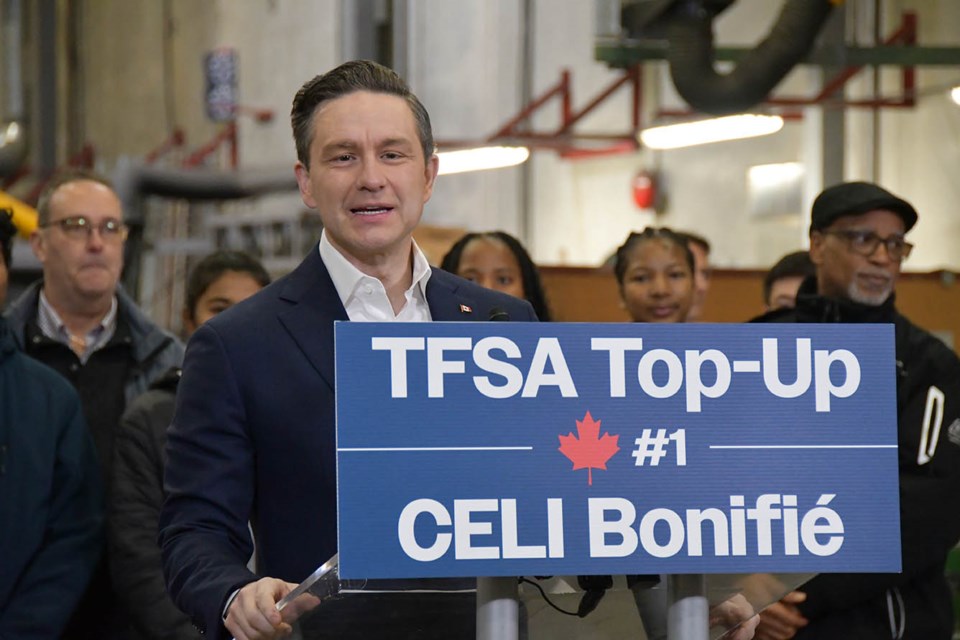Conservative Leader Pierre Poilievre returned a third time to British Columbia over the Easter long weekend, as his party executes the final days of a two-year strategy to go all-in on this province.
Poilievre visited Richmond and Surrey, making an announcement to change the Criminal Code to allow judges to sentence people to involuntary addictions care.
It was another in a series of drug and crime-related announcements the Conservatives had made in B.C., including a pledge to scrap decriminalization, increase addictions treatment funding and ban overdose prevention sites.
“It’s very important,” Poilievre said Saturday when I asked him about how B.C. fits into his election strategy.
“The question for British Columbians is, after a lost Liberal decade of skyrocketing costs and crime, can you afford a fourth Liberal term?”
In contrast, Liberal Leader Mark Carney has visited the province once during the election — though both leaders are expected to return again during cross-country blitzes in the final days.
Poilievre has campaigned in the province 19 times since he became leader two and a half years ago, visiting B.C. frequently to pick up on themes of crime, addictions, housing affordability, cost of living and expanded natural resource jobs in forestry, mining and natural gas.
His party says he’s held more than 275 events in 40 communities, many of which have never been visited by the federal Liberals, either through Carney or predecessor Justin Trudeau.
Poilievre has targeted a young, working-class, frustrated blue-collar voter base that has morphed over the last decade from New Democrat to Conservative, often holding events at sawmills and factories in places like Campbell River, Castlegar and Penticton.
When the election writ dropped, the Conservatives had candidates ready in 34 of 43 B.C. ridings, compared with 19 Liberals, allowing for extra days out organizing.
The original Conservative plan for B.C. appeared to be to fan the flames of strong second-place showings from the 2021 election in ridings like Nanaimo-Ladysmith and North Island; make inroads in Burnaby, Richmond and Surrey; and target the only two ridings in the interior the party didn’t win last time.
Combined with low Liberal polling under Trudeau, the Conservatives saw potential to grow their 14 B.C. seats by at least half a dozen more at the expense of the 14 Liberal, 13 NDP and one Green ridings.
But the collapse of the federal NDP has thrown much uncertainty into battleground B.C.
Parties are now left targeting unexpected new ridings, while the Conservatives also fend off progressive anti-vote-splitting campaigns that encourage New Democrats to vote Liberal to block Conservatives.
“I'm calling for people to vote according to what they care about most. And if they want to stop a Conservative here on Vancouver Island, the best way to do that is to vote for a New Democrat,” NDP Leader Jagmeet Singh said in Victoria on Sunday.
The NDP’s five ridings in Metro Vancouver — Vancouver East, Vancouver Kingsway, Burnaby South, New Westminster-Burnaby-Maillardville and Port Moody-Coquitlam — are all vulnerable this election, as are its six seats on Vancouver Island.
The Conservatives hope their focus on natural resource jobs will help defeat the NDP in its two Interior ridings of Similkameen-South Okanagan-West Kootenays and Skeena-Bulkley Valley.
The Liberals, meanwhile, see Conservative vulnerability in areas like Kelowna, one of the few communities Carney has visited.
Liberal strategists also hope to benefit from Conservative missteps, such as refusing to give the Conservative nomination in Abbotsford-South Langley to longtime BC cabinet minister Mike de Jong, who is now running as an independent, setting up a potential vote-split in what would otherwise be a safe Conservative seat.
Still, if there are major Conservative gains in British Columbia on election, it won’t be a secret why: The party under Poilievre has put more effort into this province over the last two years than any of its rivals.
Rob Shaw has spent more than 17 years covering B.C. politics, now reporting for CHEK News and writing for Glacier Media. He is the co-author of the national bestselling book A Matter of Confidence, host of the weekly podcast Political Capital, and a regular guest on CBC Radio.
[email protected]
馃毃New newsletter alert! Stay ahead of the curve in B.C. politics. Get expert political analysis delivered straight to your inbox, plus inside scoops and other stories from across the province.





